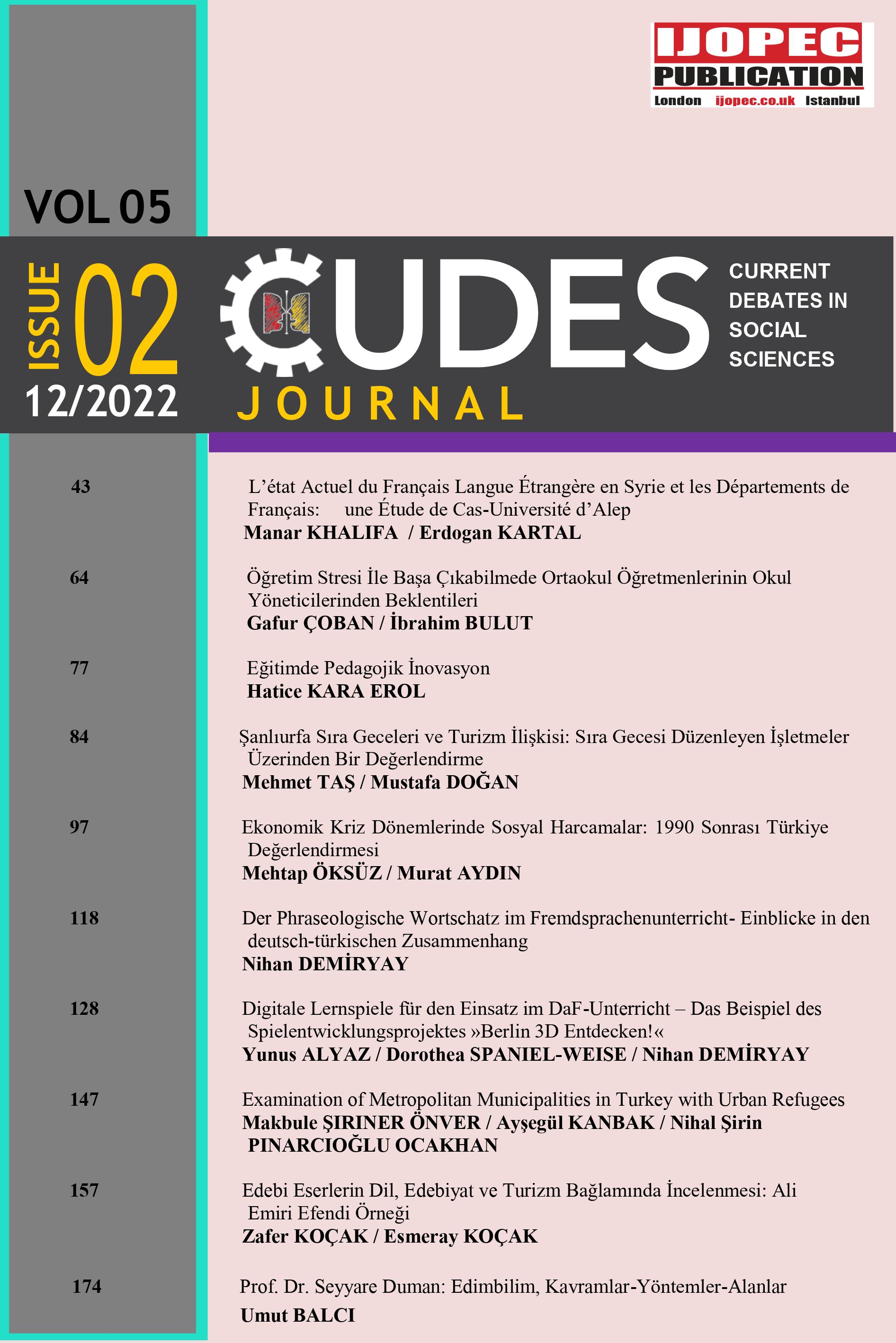Author :
Abstract
Bu araştırmanın amacı, 21. yüzyıl eğitim ve öğretim anlayışında önemli bir yeri olan pedagojik inovasyon kavramını ve içeriğini açıklamaktır. Günümüzde bilginin hızla yayılması ve değişmesi ile birlikte eğitim paradigmasında da değişimler meydana gelmiş; eğitim ve öğretim kavramlarına yönelik yeni yaklaşımlar ortaya çıkmıştır. Çağın gerekliliklerine ayak uydurabilmek için eğitimde pedagojik inovasyonun uygulanması gerektiği düşüncesi birçok ülkede kabul edilmektedir. Bu bağlamda pedagojik inovasyonun eğitime nasıl bir etkisi olduğunu anlamak son derece önemlidir. İlgili çalışmada öğretmenler, öğrenciler, okul yönetimi ve teknoloji pedagojik inovasyonun bileşenleri olarak ele alınmıştır. Araştırmada, pedagojik inovasyonun; tek başına tüm eğitim sorunlarına çözüm olmasa da 21. Yüzyıl eğitimcileri için farklı bir bakış açısı geliştirmede önemli olduğu sonucuna ulaşılmıştır.
Keywords
Abstract
This research aims to explain the concept and content of pedagogical innovation, which has an important place in 21st-century education and training understanding. Today, with the rapid spread and change of information, changes have occurred in the educational paradigm; new approaches to education and training concepts have emerged. The idea that pedagogical innovation should be applied in education to keep up with the requirements of age is accepted in many countries. In this context, it is extremely important to understand how pedagogical innovation affects education. In the related study, teachers, students, school management, and technology are considered components of pedagogical innovation. In research, pedagogical innovation; Although it is not a solution to all educational problems on its own, has been concluded that it is important in developing a different perspective for 21st-century educators.
Keywords
- Abdullayevna, B., Z. (2019). Pedagogical innovations in the modern education system. European Journal of Research and Reflection in Educational Sciences, 7(12), 1070-1073.
- Castro, E., & Brazao, P. (2022). Contemporary education and pedagogical innovation: A new paradigm. Revista online de Política e Gestão Educacional, 26, 1-22. DOI: https://doi.org/10.22633/rpge.v26i00.17221
- Christopher, E., Laasch, O., & Roberts, J. (2017). Pedagogical innovation and paradigm shift in the ıntroduction to Management Curriculum. Journal of Management Education, 41(6), 787–793. https://doi.org/10.1177/1052562917724553
- Costes-Onishi, P., Baildon, M., & Aghazadeh, S. (2020) Moving inquiry-based learning forward: A meta-synthesis on inquiry-based classroom practices for pedagogical innovation and school improvement in the humanities and arts, Asia Pacific Journal of Education, 40(4), 552-575, DOI: 10.1080/02188791.2020.1838883
- Dede, C. (2010). Comparing frameworks for 21st century skills. In J. Bellanca & R. Brandt (Eds.), 21st century skills: Rethinking how students learn (pp. 51– 74). Bloomington, In Solution Tree.
- East, M. (2014). Mediating pedagogical innovation via reflective practice: A comparison of pre- service and in-service teachers’ experiences. Reflective Practice: International and Multidisciplinary Perspectives, 15(5), 686–699. https://doi.org/10.1080/14623943.2014.944128
- Farkhodovich. N., A. (2022). Main approaches to pedagogical innovation. Science and Innovation, 1(7), 444,446.
- Howard, P., Becker, C., Wiebe, S., Carter, M., Gouzouasis, P., McLarnon, M., Richardson, P., Ricketts, K., & Schuman, L. (2018) Creativity and pedagogical innovation: Exploring teachers’ experiences of risk-taking, Journal of Curriculum Studies, 50(6), 850-864, DOI: 10.1080/00220272.2018.1479451
- Mohd Yusoff, N., Abdul Aziz, M. N., Shuib, A. S., Syed Idrus, S. K., Hassan, M. K. N., Siraj, S., Yaakob, M. N., & Ahmad Puad, M. I. (2022). An examination of needs analysis research in implementing innovative pedagogy among trainee teachers. Journal of Contemporary Social Science and Education Studies (JOCSSES), 2(2), 86–98. Retrieved from http://www.jocss.com/index.php/multidiscipline/article/view/128
- Oddone F. (2016), Self-Efficacy: a booster for pedagogical innovation. Journal of e-Learning and Knowledge Society, 12(3), 51-64.
- Smith, M. K. (2012). What is pedagogy? The encyclopaedia of informal education. Retrieved from: http://infed.org/mobi/what-is-pedagogy/.
- Süer, S. , Altındağ Kumaş, Ö. & Karagül, A. (2021). Investigating the teachers’ innovative pedagogical practices towards students with special needs . Academia Eğitim Araştırmaları Dergisi, 6(2) , 363-381 . DOI: 10.53506/egitim.902289
- Van Manen, M. (1991). The tact of teaching: The meaning of pedagogical thoughtfulness. London, ON: Althouse Press.
- Walder, A. M. (2015). A Theoretical model for pedagogical ınnovation: a tripartite construction of pedagogical ınnovation focusing on reasons for and means of ınnovating, Journal of Studies in Social Sciences, 12(1), 180-197.
- Weitze, C. L. (2017). Designing pedagogical innovation for collaborating teacher teams. Journal of Education for Teaching, 43(3): 361–373. DOI: https://doi.org/10.1080/02607476.2017.1319511
